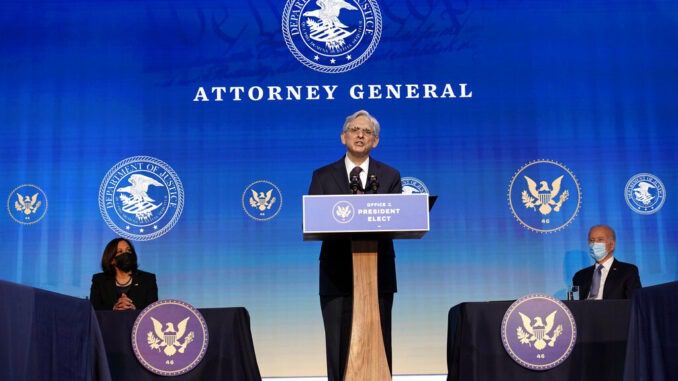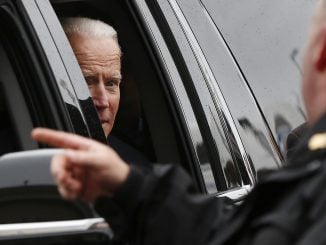
WILMINGTON, Del. — President-elect Joe Biden introduced Merrick Garland as his pick for attorney general on Thursday, naming the judge to “de-politicize” the Justice Department.
“The past four years we’ve had a president who’s made his contempt for our democracy, our Constitution, the rule of law, clear in everything he has done,” Biden declared, vowing a dramatic change in his administration. “More than anything, we need to restore the honor, the integrity, the independence of the Department of Justice that’s been so badly damaged.”
If confirmed by the Senate, Garland would take over as the nation’s top law enforcement official at a critical moment for the country and the agency. He would inherit immediate challenges related to civil rights and an ongoing criminal tax investigation into Biden’s son Hunter.
Biden vowed that Garland’s loyalty would rest not with the president, but with the law and Constitution.
“You don’t work for me,” Biden charged as he introduced Garland.
Facing the public for the first time at Biden’s side, Garland promised to restore independence and integrity to the Justice Department.
Senate Republicans spurned Garland four years ago, refusing even to hold hearings when President Barack Obama nominated him for the Supreme Court. But now, his confirmation prospects were all but ensured when Democrats scored control of the Senate majority by winning both Georgia Senate seats.
Biden also introduced three others for senior Justice Department leadership posts, including Obama administration homeland security adviser Lisa Monaco as deputy attorney general and former Justice Department civil rights chief Vanita Gupta as associate attorney general, the No. 3 official. He also named an assistant attorney general for civil rights, Kristen Clarke, now the president of Lawyers’ Committee for Civil Rights Under Law, a left-leaning advocacy group.
Garland was selected over other finalists including former Sen. Doug Jones, D-Ala., and former Deputy Attorney General Sally Yates.
Black and Latino advocates had wanted a Black attorney general or someone with a background in civil rights causes and criminal justice reform. Groups including the NAACP Legal Defense and Educational Fund had championed Garland’s Supreme Court nomination, but the extent of support from minority groups for the attorney general job was not immediately clear.
The selection of Gupta and Clarke, two women with significant experience in civil rights, appeared designed to blunt any concerns and served as a signal that progressive causes would be prioritized in the new administration.
Monaco brings to the department significant national security experience, including in cybersecurity — an especially urgent issue as the U.S. government confronts a devastating hack of federal agencies that officials have linked to Russia.
Garland, who as a senior Justice Department official helped manage the federal government’s response to the 1995 bombing of a government building in Oklahoma City that killed 168 people, called the work the “most important thing I have done.”
Garland has been on the federal appeals court in Washington since 1997. Before that, he had worked in private practice, as well as a federal prosecutor, a senior official in the Justice Department’s criminal division and as the principal associate deputy attorney general.


